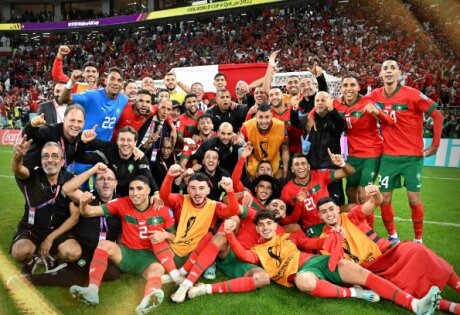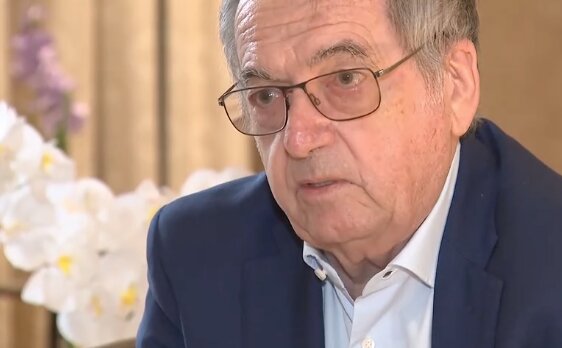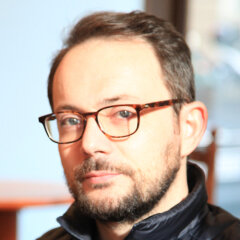
France-Morocco: "A taster of the revival of relationship between the two States" (J-B. Guégan)
"Relations between Morocco and France have warmed up recently after a few months of tension. The proof is that a state visit by Emmanuel Macron
 Président de la République @ Présidence de la République (Élysée)
Président de la République @ Présidence de la République (Élysée)
to Morocco is on the horizon in 2023. The match will therefore be a good taster of the revival of the bilateral relationship between the two States," said Jean-Baptiste Guégan
 Enseignant chargé du cours "Histoire du sport en Afrique" @ Sciences Po (Reims) • Enseignant en géopolitique du sport @ Institut libre d'étude des relations internationales (ILERI) • Chargé de cours…
, an expert and author on the geopolitics of sport, to News Tank Football on 12/12/2022.
Enseignant chargé du cours "Histoire du sport en Afrique" @ Sciences Po (Reims) • Enseignant en géopolitique du sport @ Institut libre d'étude des relations internationales (ILERI) • Chargé de cours…
, an expert and author on the geopolitics of sport, to News Tank Football on 12/12/2022.
France - Morocco, the second semi-final of the 2022 World Cup
 22nd World Cup, held in Qatar in November and December (final on 18/12/2022)
, will take place on Wednesday 14/12/2022 at the Al Bayt Stadium in Al-Khor, Qatar (kick-off at 20:00 CET
Central European Time
). This is the first time the two countries have met at a World Cup. The last time France and Morocco faced each other was in a friendly in 2007 (2-2).
22nd World Cup, held in Qatar in November and December (final on 18/12/2022)
, will take place on Wednesday 14/12/2022 at the Al Bayt Stadium in Al-Khor, Qatar (kick-off at 20:00 CET
Central European Time
). This is the first time the two countries have met at a World Cup. The last time France and Morocco faced each other was in a friendly in 2007 (2-2).
"Historically, Morocco and France have long been linked. Beyond the temporary tensions and the end of the protectorate in 1956, relations have been numerous and intense. Morocco is France's leading African partner and the largest recipient of AFD
 French Development Agency, a public financial institution that implements policy defined by the French Government and works to fight poverty and promote sustainable development.
financing in the world. With the largest network of French Institutes, the Cherifian Kingdom is all the more oriented towards France as it sends more than 45,000 students to France. In return, it welcomes more than 50,000 French nationals on its soil and probably many more if we believe the consular registers," said Jean-Baptiste Guégan.
French Development Agency, a public financial institution that implements policy defined by the French Government and works to fight poverty and promote sustainable development.
financing in the world. With the largest network of French Institutes, the Cherifian Kingdom is all the more oriented towards France as it sends more than 45,000 students to France. In return, it welcomes more than 50,000 French nationals on its soil and probably many more if we believe the consular registers," said Jean-Baptiste Guégan.
"For its part, France is Morocco's second largest trading partner and a major player in its big projects. As for the Moroccan diaspora in France, it is the main provider of foreign currency for the kingdom. In addition to this, Moroccans represent, with more than 700,000 nationals on our soil, the second foreign minority outside Europe after Algeria," added the expert, who answered questions from News Tank Football on the France-Morocco match, as well as on the main geopolitical facts regarding the World Cup in Qatar.
"This World Cup has been very political, very politicised, but much less than some had hoped" (J-B. Guégan)
Has Qatar already made a success of this World Cup?
It has succeeded firstly because it has managed to host it, and secondly because it has managed to organise it well. Even if the number of spectators expected - more than 700,000 - is lower than hoped for (1.2 million), it was not as obvious as that between the calls for a boycott, the recurrent controversies and the Covid pandemic.
No real incidents despite a large number of matches with a strong political dimension »The first round took place without the crowd problems that many anticipated and it must be said that the sporting spectacle was there. There were no real incidents, despite a large number of matches with a strong political dimension.
Apart from the legitimate debates that accompany this World Cup, the specifications for such an event were respected at all levels by Qatar, which even managed to bend FIFA
![]() Fédération Internationale de Football Association
on several points.
Fédération Internationale de Football Association
on several points.
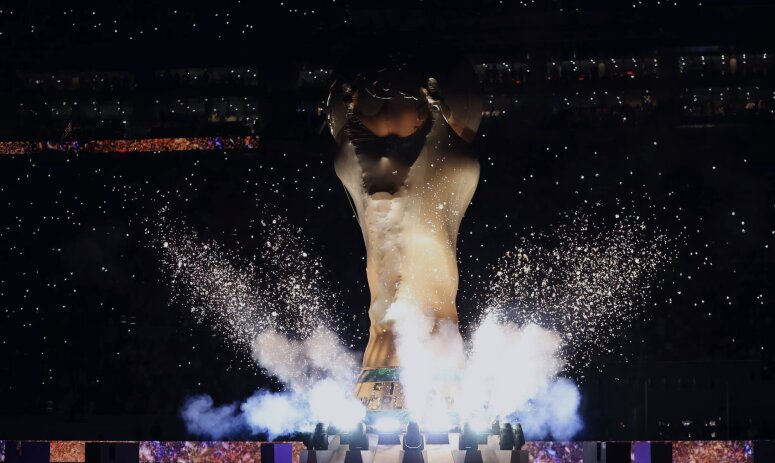
The latter, on the other hand, did not manage its communication well, as we saw on the issue of beer distribution two days before the kick-off of the competition. It posed as a defender of Qatar's values, on the wearing of the One Love armband or on the Iran - USA match (0-1, 29/11/2022) for example, when this is not its role. Apolitism and universality sometimes pose limits for FIFA.
Apolitism and universality sometimes pose limits for FIFA »Qatar 2022 is perhaps, and rightly so, the most maligned World Cup, with the most politically charged matches, and yet it went well. A paradox is that all the teams that were heavily involved in politics from the start, such as Germany and Denmark, were quickly eliminated.
Some are even saying that it is among the most successful from a sporting point of view for a long time.
It was feared that the host country's poor results (three defeats in three matches for Qatar) would damage the general enthusiasm for the competition at home. This has not been the case...
For the Qatari people and the Emir Al Thani, it was a small disaster because they expected to get through the first round, just as the Russian team did in 2018.
Qatar has benefited from a "substitution team" phenomenon »But Qatar has benefited from a "substitution team" phenomenon to make up for the drop in interest caused by the host country's elimination. Morocco has, rallied behind it, not only the Arab world, but also Africa and well beyond the continent's borders by mobilising its diasporas.
Among the other "relay teams", and this is the irony of the story, is Saudi Arabia. We have seen images, unthinkable six or eight months ago, of Saudis cheering and celebrating their country's victory on Qatar soil.
Mohammed bin Salmane, Saudi Arabia's crown prince, took pride of place at the opening ceremony. Was this a surprise?
The image of MBS (initials of Mohammed bin Salman) in the foreground with Emir Al-Thani, and then the fact that Al-Sissi (President of Egypt) and Erdogan (President of Turkey) could be seen at the back in the stands, aroused everyone's interest. Like a remake of Russia 2018, the opening ceremony illustrated this World Cup's geopolitical dimension and the state of Qatar's relations with the other Gulf States. Far from the blockade of a few months ago.
The opening ceremony illustrated this World Cup's geopolitical dimension »What is surprising is that, this time, Saudi Arabia had nothing to play for in sporting terms, as the Saudi national team was not involved in this match (Qatar - Ecuador, 0-2 on 20/11/2022). Mohammed bin Salman was thus in the position of guest of honour in an opening match where Qatar was making its debut in the tournament and welcoming the world. Politically, this is not insignificant.

There is a desire, by the Qatari power, to stage their relationship, with Saudi consent. A relationship that had been put on hold during the Gulf blockade from 2017, which ended with the Al Ula (Saudi Arabia) agreements in January 2021.
Surprising displays of affection between Qatar and Saudi Arabia »This willingness to script their newfound relationship for the world and the Arab world in particular has been accompanied by some surprising displays of affection. MBS was seen in the corridors of the stadium, just before he took his seat, wearing a scarf in the colours of Qatar. Two days later, it was Emir Al-Thani who displayed a Saudi Arabian flag around his neck during the match against Argentina (Saudi Arabia won 2-1 on 22/11/2022). A flag that he even waved. This excessive demonstration should also be considered with a step back.
Indeed, an hour before the World Cup kicked off, the Qatari platform TOD TV had its signal cut off in Saudi Arabia, which was later restored. All is not forgotten or completely forgiven.
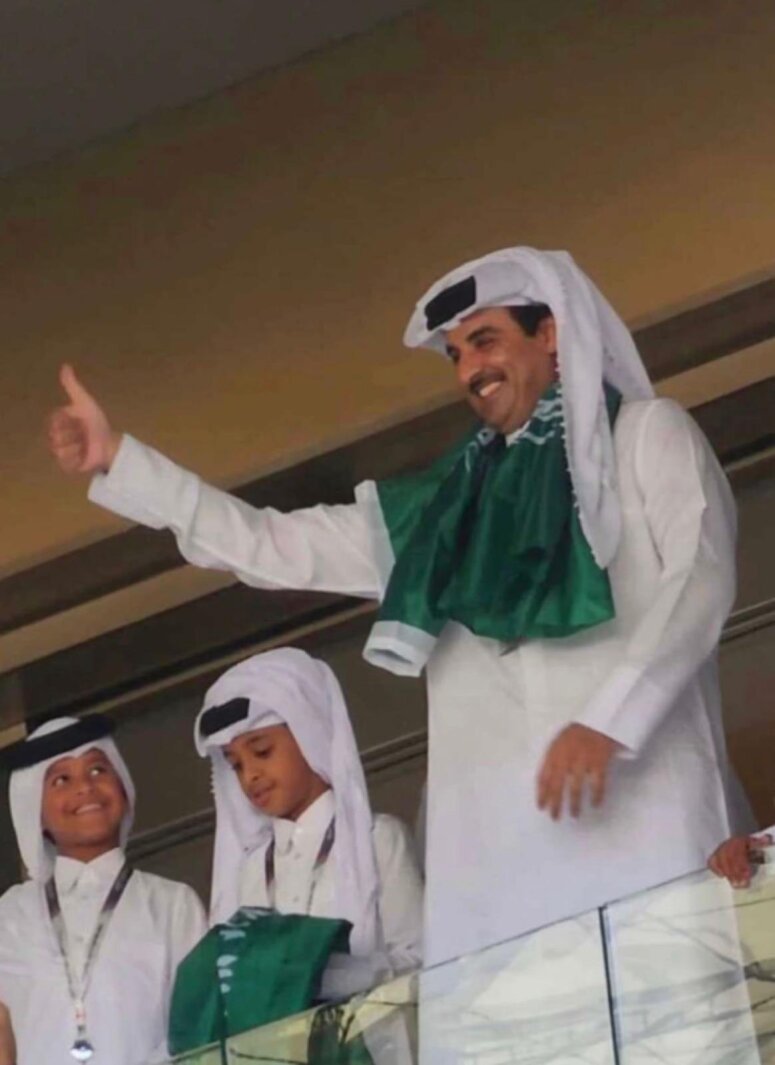
How can this paradox be explained?
It is a demanding diplomatic relationship: a balance of power always persists in the background. Saudi Arabia has reminded Qatar that it is a major player in the region and that even if the emirate organises a major event like the World Cup, it is not in a relationship of dependence or inferiority. Quite the contrary. It still has the leadership in the region.
What is also interesting is to note not the present, but the absent: the representative of Bahrain, as well as Mohammed bin Zayed, Emir of Abu Dhabi and President of the United Arab Emirates since 2022, were not there. Unlike Saudi Arabia, these two countries have still not moved closer to Qatar, despite the end of the blockade.
In Qatar nobody has forgotten the Gulf crisis »On the other hand, MBS needs to show that he knows how to ease tensions, especially with his allies such as the United States, but also with his present and future partners. This is largely because his major projects and his desire to modernise Saudi Arabia require significant support and funding.
Thus, no one is fooled. In the end, we are in the midst of a typical Gulf relationship: one is present, one appears close, but there will always be a potential for tension despite the current good relations being staged. All the players have a memory and in Qatar, nobody has forgotten the Gulf crisis.
Has the Qatari gamble of communicating about the hosting of the first World Cup in the Middle East, beyond the emirate, been successful?
When the Qatar bid was proposed in 2009, it was presented as an Arab World Cup. Everyone thought it was a communication element to create unity behind the emirate. Then they refocused their discourse. They put forward this World Cup as the region's World Cup, i.e. the Arabian Peninsula. Once again, no one was fooled. It is first and foremost a Qatari World Cup. However, in the end, it was impossible to do otherwise and the story of a World Cup on several different scales worked.
An unexpected assent of Arab populations in favour of the World Cup »Due to the 2017 blockade, Qatar again communicated about offering an event to the wider Arab world, beyond just the Persian Gulf. It was about reaching out to Saudi Arabia, Syria, the Maghreb and so on. However, once the World Cup started, we saw an unexpected assent of the populations in favour of the World Cup and a return of the leading political actors both in their countries and locally.
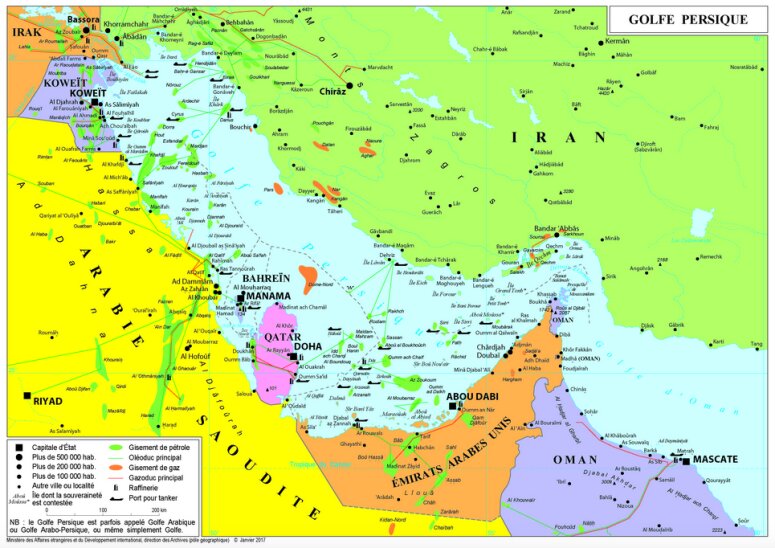
No one imagined Mohamed VI, the King of Morocco, celebrating his country's qualification for the quarter-finals in the streets of Rabat in a car among the people. Qatar has really taken on the Arab dimension of this World Cup, it has encouraged it and it has taken advantage of it to promote Qatari values, culture and traditions, but not only. The sporting results have accompanied the Qatari narrative, even beyond expectations.
A desire to move away from a Western or European prism, in favour of a global, decentred and more universal point of view »Qatar and FIFA also seemed to show a desire to move away from a Western or European prism with this World Cup, in favour of a global, decentred and more universal point of view.
However, there are limits to this staging. The first is that FIFA opposed the campaign against Islamophobia that the Emirate and its neighbours wanted, a campaign that was supposed to raise awareness of world opinion through an armband that referred to the colours of the keffiyeh, the scarf traditionally associated with the Arab world and the Palestinian struggle.
The second limitation is the absence of participants. The states that were not present undermined this image of unity. However, it must be acknowledged that what we saw improved the prospects of success for a Saudi Arabian bid in 2030 (World Cup) or that of Qatar for the 2036 Olympic Games.
Moreover, the question arises of the two countries co-organising the 2036 Summer Games, still based on the idea of an Arab world competition, with financing that would be unprecedented and an extraordinary staging. This is no longer as unlikely as it was a few months ago.
Has this image of unity in the Arab world made it possible to extinguish the controversy over the working conditions of migrants or the rights of the LGBT community in Qatar?
The staging of an Arab world reunited by Qatar during this World Cup has attracted sustained media attention. This was done to the detriment of the demands of NGOs and the criticisms made about the Emirate's organisation of the World Cup. The controversy has not disappeared, but it has taken a back seat.
The controversy has not disappeared, but it has taken a back seat »Waiting until the start of the sporting event and capitalising on the idea of unity was probably part of the Qatari strategy and it worked relatively well. Even if we saw Nasser Al-Khater (CEO of the 2022 FIFA World Cup Qatar) throw oil on the fire himself by going back on the number of deaths on the construction sites or by declaring that death was part of life. These comments shocked many and rekindled criticisms that had faded into the background as the competition progressed.
With this World Cup, Qatar has thus succeeded in displaying the unity of the Arab world while imposing itself as a mediating power. It has also succeeded in putting the game before the issues. Calls for boycotts and NGO speeches have gradually disappeared. We even saw a player like Hugo Lloris being congratulated for saying that the host country should be respected, in line with the position of Noël Le Graët

and the FFF
 Fédération Française de Football (French Football Federation)
.
Fédération Française de Football (French Football Federation)
.
However, we will have to see what will be left of all this in the long term. The final staging and the winner of the event will also be important in characterising and building the legacy of Qatar 2022.
This World Cup has been very political, very politicised, but much less than some had hoped.
Among the flags seen in the stands is the Palestinian flag, sometimes even flown by the players themselves. Was this expected?
It is very common to see Palestinian flags in stadiums. We see it regularly in France. But since the Palestinian cause has really taken a back seat in this region, one could have imagined an order forbidding it to spectators, given the rapprochement between Qatar and Israel, which allowed Israeli spectators and journalists to take part in the World Cup without any difficulties.
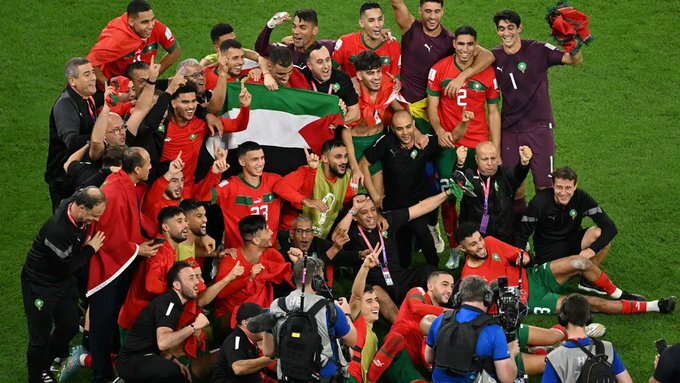
This flag was indeed surprisingly present, and was one of the best-selling flags in the Souq Waqif (in Doha) according to several observers on the ground. FIFA and the organisers were very careful about the flags and messages that entered the stadiums, especially the rainbow flag. But obviously not when it came to the flag of Palestine.
Palestinian flag among the best-selling in the Souq Waqif (Doha, QAT) »The most surprising thing is that some teams took it, waved it, and that we saw it on our screens, while the producers were hiding certain images from the viewers, such as people crossing the pitch with political messages.
The Palestinian cause was therefore not a subject to be avoided. It also contributes in some way to the unity of the Arab world. Indeed, there is a pro-Palestinian tropism in the streets and in the opinions of the different countries that make up the world. Morocco demonstrated this by waving the flag during their quarter-final.
For the first time in the history of the World Cup, all five continents were represented in the Round of 16. What does this tell us about the evolution of football?
One could say that the globalisation of football was achieved before Qatar 2022. But this is perhaps the first time that we have seen the "globality" of football to this extent. You can see that the different continents are integrated from an economic point of view.
Europe-South America diarchy still functioning but could be eroded as early as 2026 »What is surprising is that there is at least one country in every continent that can do well in a demanding competition like the World Cup and get through the first round. This says a lot about the global nature of the game, which is a consequence of all the teams becoming more skilled, and FIFA obviously plays a part in this.
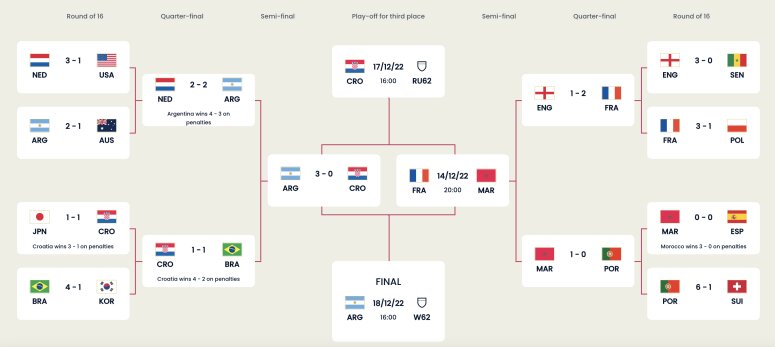
The Europe-South America diarchy is still functioning but could be eroded as early as 2026 when the first World Cup with 48 teams, 16 more than today, is held. There could be an even more significant reshuffling of the cards, as is the case in other sectors of the economy, to the benefit of greater fragmentation and perhaps a wider distribution of talent.
Morocco are in the semi-finals versus France. Never before has an African team gone so far in the competition. What is the state of relations between the two countries?
Relations between Morocco and France have warmed up recently after a few months of tension. The proof is that a state visit by Emmanuel Macron to Morocco is on the horizon in 2023. The match will therefore be a good taster of the revival of the bilateral relationship between the two States
However, apart from Western Sahara, no one has forgotten the Pegasus affair, which saw the Cherifian kingdom participate in listening to some of our leaders. The migration issue had also been at the heart of the exchanges between the two countries, leading to a reduction of half of the visas intended for Morocco and major tension.
More a meeting between brotherly peoples than between two States that have nothing to do with each other »That said, relations between Morocco and France are close enough that it was difficult to imagine that they would not evolve to become more normal. Historically, Morocco and France have long been linked. Beyond the temporary tensions and the end of the protectorate in 1956, relations have been numerous and intense.
Morocco is France's leading African partner and the largest recipient of AFD
 French Development Agency, a public financial institution that implements policy defined by the French Government and works to fight poverty and promote sustainable development.
financing in the world. With the largest network of French Institutes, the Cherifian Kingdom is all the more oriented towards France as it sends more than 45,000 students to France. In return, it welcomes more than 50,000 French nationals on its soil and probably many more if we believe the consular registers.
French Development Agency, a public financial institution that implements policy defined by the French Government and works to fight poverty and promote sustainable development.
financing in the world. With the largest network of French Institutes, the Cherifian Kingdom is all the more oriented towards France as it sends more than 45,000 students to France. In return, it welcomes more than 50,000 French nationals on its soil and probably many more if we believe the consular registers.
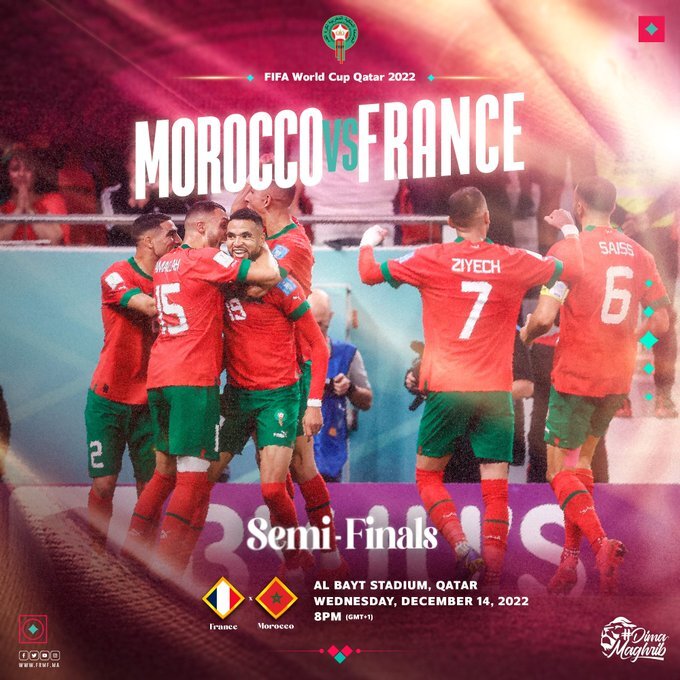
For its part, France is Morocco's second largest trading partner and a major player in its big projects. As for the Moroccan diaspora in France, it is the main provider of foreign currency for the kingdom. In addition to this, Moroccans represent, with more than 700,000 nationals on our soil, the second foreign minority outside Europe after Algeria.
Heartbreak for the nearly 500,000 dual nationals in France who will have to choose a team »This confrontation is therefore more a meeting between brotherly peoples than between two States that have nothing to do with each other. In addition to the economic ties and the historical depth behind this match, there will be emotion and heartbreak for the nearly 500,000 dual nationals in France who will have to choose a team.
The match between France and Morocco thus goes beyond the simple framework of the pitch. The two teams share friendships (Kylian Mbappé and Achraf Hakimi at Paris Saint-Germain
 Activity: French professional football club
Top sponsors:
• Nike (equipment supplier): €20m per year from 2014-15 to 2021-22, between €70-90m for the 2019-2032 cycle• Qatar Airways (airline)…
, Jules Koundé with Yassine Bounou and Youssef En-Nesyri at Sevilla FC
Activity: French professional football club
Top sponsors:
• Nike (equipment supplier): €20m per year from 2014-15 to 2021-22, between €70-90m for the 2019-2032 cycle• Qatar Airways (airline)…
, Jules Koundé with Yassine Bounou and Youssef En-Nesyri at Sevilla FC
 Activity: Spanish professional football club
Main partner:• Midea (air conditioning): main shirt sponsor, 2024-2026 Official partners:• adidas (equipment supplier): 2025-2035• Socios.com (fan…
, Olivier Giroud and Hakim Ziyech were together at Chelsea FC
Activity: Spanish professional football club
Main partner:• Midea (air conditioning): main shirt sponsor, 2024-2026 Official partners:• adidas (equipment supplier): 2025-2035• Socios.com (fan…
, Olivier Giroud and Hakim Ziyech were together at Chelsea FC
 Activity: English professional football club
Principal partners:
• Nike (equipment supplier): 2017-2032, estimated at £60m per season• BingX (crypto): training kit sponsor, 2025-2027• FPT…
). The Moroccan national team is also composed of dual nationals. Some of them play in Ligue 1 like Sofiane Boufal and Azzedine Ounahi (at Angers SCO
Activity: English professional football club
Principal partners:
• Nike (equipment supplier): 2017-2032, estimated at £60m per season• BingX (crypto): training kit sponsor, 2025-2027• FPT…
). The Moroccan national team is also composed of dual nationals. Some of them play in Ligue 1 like Sofiane Boufal and Azzedine Ounahi (at Angers SCO
 Sector: French professional football club
Major partner:• Ecole Noir et Blanc (endowment fund)Official partners:• Nike (equipment supplier): 2023-2026• U (supermarket)• L'Atoll (shopping…
), or have played there like Romain Saïss or Nayef Aguerd. Walid Regragui, the Moroccan coach, was born and raised in Corbeil-Essonnes. He was trained in France.
Sector: French professional football club
Major partner:• Ecole Noir et Blanc (endowment fund)Official partners:• Nike (equipment supplier): 2023-2026• U (supermarket)• L'Atoll (shopping…
), or have played there like Romain Saïss or Nayef Aguerd. Walid Regragui, the Moroccan coach, was born and raised in Corbeil-Essonnes. He was trained in France.
Jean-Baptiste Guégan
Enseignant chargé du cours "Histoire du sport en Afrique" @ Sciences Po (Reims)
Enseignant en géopolitique du sport @ Institut libre d'étude des relations internationales (ILERI)
Chargé de cours en géopolitique et sociologie du sport @ Groupe ESG (ESG)
Chargé de cours en géopolitique du sport @ MBA ESG
Visit in the directory
Career
Enseignant chargé du cours "Histoire du sport en Afrique"
Enseignant en géopolitique du sport
Chargé de cours en géopolitique et sociologie du sport
Chargé de cours en géopolitique du sport
Chargé de cours en géopolitique et sociologie du sport
# 28438, created on 30/01/18 at 08:10 - Updated on 22/05/24 at 17:40
© News Tank Football - 2025 - French copyright law: "Infringement of copyright (...) is punishable by three years imprisonment and a €300,000 fine. Infringement consists of all forms of reproduction, display or circulation of any intellectual work, in any medium, in violation of the rights of the author."
